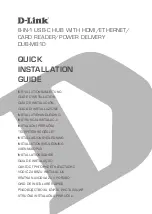
Chapter 17
| IP Configuration
Setting the Switch’s IP Address (IP Version 6)
– 461 –
Figure 307: Configuring General Settings for an IPv6 Interface
Configuring an
IPv6 Address
Use the System > IPv6 Configuration (Add IPv6 Address) page to configure an IPv6
interface for management access over the network.
Command Usage
◆
All IPv6 addresses must be formatted according to RFC 2373 “IPv6 Addressing
Architecture,” using 8 colon-separated 16-bit hexadecimal values. One double
colon may be used in the address to indicate the appropriate number of zeros
required to fill the undefined fields.
◆
The switch must always be configured with a link-local address. Therefore any
configuration process that enables IPv6 functionality, or assigns a global
unicast address to the switch, including address auto-configuration or explicitly
enabling IPv6 (see
“Configuring IPv6 Interface Settings” on page 457
), will also
automatically generate a link-local unicast address. The prefix length for a link-
local address is fixed at 64 bits, and the host portion of the default address is
based on the modified EUI-64 (Extended Universal Identifier) form of the
interface identifier (i.e., the physical MAC address). Alternatively, you can
manually configure the link-local address by entering the full address with a
network prefix in the range of FE80~FEBF.
◆
To connect to a larger network with multiple subnets, you must configure a
global unicast address. There are several alternatives to configuring this
address type:
■
The global unicast address can be automatically configured by taking the
network prefix from router advertisements observed on the local interface,
and using the modified EUI-64 form of the interface identifier to
automatically create the host portion of the address (see
Interface Settings” on page 457
■
It can be manually configured by specifying the entire network prefix and
prefix length, and using the EUI-64 form of the interface identifier to
Summary of Contents for GEL-1061
Page 14: ...Contents 14...
Page 28: ...Section I Getting Started 28...
Page 38: ...Chapter 1 Introduction System Defaults 38...
Page 40: ...Section II Web Configuration 40...
Page 60: ...Chapter 2 Using the Web Interface Navigating the Web Browser Interface 60...
Page 164: ...Chapter 6 Address Table Settings Issuing MAC Address Traps 164...
Page 192: ...Chapter 8 Congestion Control Storm Control 192...
Page 204: ...Chapter 9 Class of Service Layer 3 4 Priority Settings 204...
Page 216: ...Chapter 10 Quality of Service Attaching a Policy Map to a Port 216...
Page 430: ...Chapter 14 Multicast Filtering MLD Snooping Snooping and Query for IPv4 430...
Page 436: ...Chapter 15 IP Tools Address Resolution Protocol 436...
Page 474: ...Section III Appendices 474...
Page 492: ...Glossary 492...
Page 500: ...E052016 ST R02 150200001416A...
















































